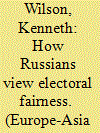| Srl | Item |
| 1 |
ID:
110025


|
|
|
|
|
| Publication |
2012.
|
| Summary/Abstract |
There is a broad consensus that the Duma and presidential elections held in Russia in 2007-2008 failed to meet internationally recognised democratic standards. Post-election public opinion surveys, however, show that most Russians thought that the elections were mainly fair. This discrepancy between the views of international observers and of Russians themselves has not been adequately explained. The main aim of this article, utilising data from a series of focus groups, is to identify potential explanations for why so many Russians assessed these elections as fair, when there was so much evidence to the contrary. Why did so many Russians view egregiously unfair elections as fair? What, furthermore, can this tell us about Russians' political values and what are the possible implications of this for Russia's political development?
|
|
|
|
|
|
|
|
|
|
|
|
|
|
|
|
| 2 |
ID:
087692


|
|
|
|
|
| Publication |
2009.
|
| Summary/Abstract |
This article analyses the party-system reforms introduced in Russia during Vladimir Putin's presidency. It contests Byron Moraski's interpretation, published in an earlier edition of this journal, which claims that the reforms introduced in Putin's second term were a response to the 2003 Duma election and were intended to preserve the unity and discipline of United Russia, the regime's 'party of power'. This article argues that Moraski's explanation of the second-term reforms is flawed and contends that the first- and second-term reforms were part of a wider reform programme designed to centralize Russia's political system, consolidate its party system and contribute to the construction of a façade democracy. The article also challenges Moraski's argument that these reforms, while introduced to advance the regime's interests, could further democratization in the longer term by adding the crucial caveat that stronger opposition parties that could act as a democratizing influence will only emerge if practices of electoral manipulation lessen or fail.
|
|
|
|
|
|
|
|
|
|
|
|
|
|
|
|